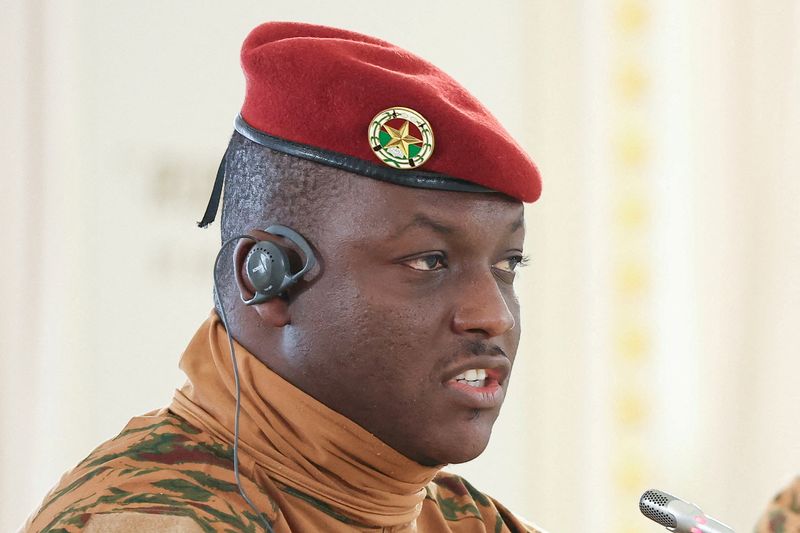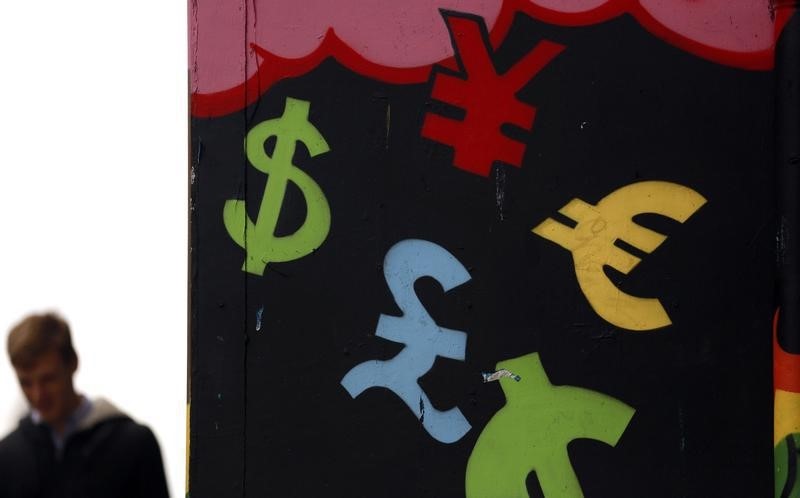
© Reuters. FILE PHOTO: Burkina Faso’s interim President Ibrahim Traore attends a gathering with Russia’s President Vladimir Putin following the Russia-Africa summit in Saint Petersburg, Russia, July 29, 2023. Alexander Ryumin/TASS Host Photograph Company through REUTERS/File Ph
By Joe Bavier and Boureima Balima
JOHANNESBURG/NIAMEY (Reuters) – Days after Burkina Faso, Mali and Niger introduced final month they have been quitting the West Africa political union ECOWAS, Burkina Faso’s army ruler Ibrahim Traore was already naming his subsequent goal: the area’s CFA franc forex.
“It is not simply the forex. Something that maintains us in slavery, we’ll break these bonds,” the 35-year-old military captain turned coup chief mentioned in an interview, posted on YouTube.
The three nations collectively introduced on Jan. 28 they have been pulling out of the Financial Neighborhood of West African States (ECOWAS) after it pressured them to revive constitutional order following a string of coups.
Having already kicked out French troopers and rolled again a U.N. mission in Mali, these states have persistently proven they worth sovereignty over expediency.
Their perspective in the direction of the euro-pegged CFA franc seems no completely different, though economists and specialists say dumping the CFA franc could be riskier and considerably extra difficult than withdrawing from ECOWAS, a transfer seen as a daring, if probably ill-advised, act of defiance.
Final November, the finance ministers of Burkina Faso, Mali and Niger mentioned they’d weigh the choice of organising a financial union and high officers from all three nations have, to various levels, voiced help for abandoning the forex.
The top of the Niger junta, Abdourahamane Tiani, mentioned in an interview on state tv on Sunday that abandoning the CFA franc could be an indication of sovereignty and a needed step in shifting away from French “colonisation”.
To take action, nonetheless, would imply way more than merely printing new banknotes.
A newly created central financial institution would want to handle a fragile transition away from the CFA franc, formulate financial coverage, and resolve what to do about greater than $4.6 billion in excellent CFA-denominated regional bonds.
‘THE FRENCH ROBBED US’
The CFA franc currencies – one West African and one other for Central Africa – sit on the coronary heart of an emotional debate over sovereignty and improvement in French-speaking Africa.
Proponents hail the CFA franc’s peg to the euro as a assure of macroeconomic stability in one of many world’s most risky areas.
Critics denounce it as a brake on progress and an outdated vestige of French colonial rule: till a 2019 reform, nations have been required to carry a portion of their overseas reserves with the French Treasury.
However by no means since its inception in 1945 has there been the prospect of such a mass exodus.
“The French have robbed us with the CFA franc. African nations should definitively break with this forex,” mentioned Omar Issoufou, a 25-year-old Nigerien who’s learning electrical engineering within the capital Niamey.
The army takeovers which have swept throughout the arid Sahel area have been pushed by anger over Islamist violence, which Mali’s U.N. mission and a sprawling French anti-militant operation had didn’t snuff out.
Punishment for the putsches – the imposition of financial sanctions by ECOWAS, together with freezing of a few of Mali and Niger’s property held by the regional central financial institution – fuelled tensions between the brand new regimes and the West African Financial and Financial Union, identified by its French acronym UEMOA.
“The second UEMOA turned a weapon of battle … I can perceive why these three nations moved to obviously free themselves from their engagements in the direction of the Union,” Hamma Hamadou, a former head of Niger’s tax authority, instructed Reuters.
Past ideological problems with sovereignty and sensible issues associated to sanctions, some view shifting away from the CFA franc as a possibility.
“The CFA franc has been very detrimental to those nations over the long term,” mentioned Ndongo Samba Sylla of Worldwide Growth Economics Associates, a community of economists centered on the International South. “They’ve decrease inflation and additional alternate price stability, however they’ve suffered from an over-valued forex.”
All three nations have largely agricultural economies. However their incapacity to set financial coverage has left their exports uncompetitive, he mentioned, and hindered industrial improvement.
The peg to the euro, in the meantime, makes little sense when the majority of West Africa’s exterior commerce is completed in {dollars}, he added.
‘GREAT DEPRESSION’
Withdrawing from ECOWAS is already trying simpler mentioned than accomplished. Disentangling their economies and funds from UEMOA will probably be much more delicate.
UEMOA’s eight members deposit their overseas alternate reserves with the Dakar-based regional central financial institution. These reserves are mutualised as are liabilities, making a willpower of how a lot every nation would be capable to stroll away with a troublesome calculation.
Then there’s the query of CFA-denominated debt. Burkina Faso has over 1.2 trillion CFA francs ($1.99 billion) in excellent bonds. Mali has barely over 1 trillion CFA francs, whereas it is 498 billion CFA francs for Niger.
“We are going to enter right into a zone of turbulence if these nations pull out,” mentioned one monetary professional concerned in regional debt issuances, who requested to not be named because of market sensitivity.
There was no readability, he mentioned, on the place the bonds could be listed, whether or not they would stay in CFA francs or even when the brand new forex could be convertible.
“There could be lots of issues for the holders of those sovereign bonds,” he mentioned.
The turmoil would seemingly depart the three states lower off from future financing from regional and worldwide capital markets, specialists mentioned. Burkina Faso already referred to as off a bond public sale within the wake of its ECOWAS withdrawal announcement because of an absence of curiosity.
Uncertainty may provoke capital flight and an instantaneous depreciation of a brand new forex. Imports may develop into prohibitively costly, fuelling run-away inflation.
“I believe you are taking 10% to twenty% off your GDP,” mentioned Charlie Robertson, head of macro technique at London-based FIM Companions. “Leaving the one forex is bringing on the Nice Despair,” he mentioned, including it could be the worst coverage mistake the nations may make.
In mild of those dangers, the juntas are approaching the forex query extra fastidiously than their ECOWAS withdrawal.
Two authorities officers from the nations instructed Reuters that the committee charged with learning a brand new financial union, whereas nonetheless deliberate, had not but met.
Prime Minister Choguel Maiga of Mali – the one one of many three to have ever issued its personal forex – has urged persistence.
When Mali exited UEMOA in 1962 within the wake of independence, its new forex was at parity with the CFA franc, however upon its return to the union in 1984 was price solely half as a lot.
To make sure classes have been realized, Maiga says the committee wants time to evaluate all of the implications earlier than the nation attracts up plans for a brand new forex with its two neighbours.
“That is what I say to the Malians,” Maiga instructed enterprise leaders final month. “Positive, you might have this ardour. You need it. However that is strategic.”
($1 = 604.0000 CFA francs)

